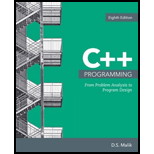
C++ Programming: From Problem Analysis to Program Design
8th Edition
ISBN: 9781337102087
Author: D. S. Malik
Publisher: Cengage Learning
expand_more
expand_more
format_list_bulleted
Textbook Question
thumb_up100%
Chapter 3, Problem 12SA
What is the output of the following program? (2, 3, 6, 8)
#include <iostream>
#include <cmath>
#include <string>
#include <iomanip>
using namespace std;
int main()
{
double x, y;
string str;
x = 9.0;
y = 3.2;
cout << fixed << showpoint << setprecision (2);
cout << x << "^" << y << " = " << pow(x, y) << endl;
cout << "5.0^2.5 = " << pow(5.0, 2.5) << endl;
cout << "sqrt (48.35) = " << sqrt (48.35) << endl;
cout << "static_cast<int>(sqrt(pow (y, 4))) = "
<< static_cast<int>(sqrt(pow (y, 4))) << endl;
str = "Predefined functions simplify
cout << "Length of str = " << str.length() << endl;
return 0;
}
Expert Solution & Answer
Want to see the full answer?
Check out a sample textbook solution
Students have asked these similar questions
Dijkstra's Algorithm (part 1). Consider the network shown below, and Dijkstra’s link-state algorithm. Here, we are interested in computing the least cost path from node E (note: the start node here is E) to all other nodes using Dijkstra's algorithm. Using the algorithm statement used in the textbook and its visual representation, complete the "Step 0" row in the table below showing the link state algorithm’s execution by matching the table entries (i), (ii), (iii), and (iv) with their values. Write down your final [correct] answer, as you‘ll need it for the next question.
4. |z + 5 - 5i| = 7
14.
dz,
C: |z❘
C: |z❘ = 0.6
ze² - 2iz
H
Chapter 3 Solutions
C++ Programming: From Problem Analysis to Program Design
Ch. 3 - Mark the following statements as true or false. An...Ch. 3 - Prob. 7SACh. 3 - What does function sqrt do? Which header file must...Ch. 3 - Prob. 9SACh. 3 - Prob. 10SACh. 3 - 11. What is the purpose of the manipulator setw?...Ch. 3 - 12. What is the output of the following program?...Ch. 3 - Prob. 13SACh. 3 - Suppose that name is variable of type string. What...Ch. 3 - 16. Write a C++ statement that uses the...
Ch. 3 - 19. The following program is supposed to read the...Ch. 3 - Prob. 20SACh. 3 - Prob. 21SACh. 3 - 22. Suppose that infile is an ifstream variable...Ch. 3 - 24. Suppose that infile is an 18stream variable...Ch. 3 - 1. Consider the following incomplete C++ program:...Ch. 3 - 2. Consider the following program in which the...Ch. 3 - Write a program that prompts the user to enter the...Ch. 3 - 4. During each summer, John and Jessica grow...Ch. 3 - 5. Three employees in a company are up for a...Ch. 3 - 6. Write a program that accepts as input the mass,...Ch. 3 - Interest on a credit card's unpaid balance is...Ch. 3 - Prob. 8PECh. 3 - Dairy Farm decided to ship milk in containers in...Ch. 3 - 10. Paula and Danny want to plant evergreen trees...
Knowledge Booster
Learn more about
Need a deep-dive on the concept behind this application? Look no further. Learn more about this topic, computer-science and related others by exploring similar questions and additional content below.Similar questions
arrow_back_ios
SEE MORE QUESTIONS
arrow_forward_ios
Recommended textbooks for you
 C++ Programming: From Problem Analysis to Program...Computer ScienceISBN:9781337102087Author:D. S. MalikPublisher:Cengage Learning
C++ Programming: From Problem Analysis to Program...Computer ScienceISBN:9781337102087Author:D. S. MalikPublisher:Cengage Learning Microsoft Visual C#Computer ScienceISBN:9781337102100Author:Joyce, Farrell.Publisher:Cengage Learning,
Microsoft Visual C#Computer ScienceISBN:9781337102100Author:Joyce, Farrell.Publisher:Cengage Learning, C++ for Engineers and ScientistsComputer ScienceISBN:9781133187844Author:Bronson, Gary J.Publisher:Course Technology Ptr
C++ for Engineers and ScientistsComputer ScienceISBN:9781133187844Author:Bronson, Gary J.Publisher:Course Technology Ptr EBK JAVA PROGRAMMINGComputer ScienceISBN:9781337671385Author:FARRELLPublisher:CENGAGE LEARNING - CONSIGNMENTProgramming Logic & Design ComprehensiveComputer ScienceISBN:9781337669405Author:FARRELLPublisher:Cengage
EBK JAVA PROGRAMMINGComputer ScienceISBN:9781337671385Author:FARRELLPublisher:CENGAGE LEARNING - CONSIGNMENTProgramming Logic & Design ComprehensiveComputer ScienceISBN:9781337669405Author:FARRELLPublisher:Cengage

C++ Programming: From Problem Analysis to Program...
Computer Science
ISBN:9781337102087
Author:D. S. Malik
Publisher:Cengage Learning

Microsoft Visual C#
Computer Science
ISBN:9781337102100
Author:Joyce, Farrell.
Publisher:Cengage Learning,

C++ for Engineers and Scientists
Computer Science
ISBN:9781133187844
Author:Bronson, Gary J.
Publisher:Course Technology Ptr

EBK JAVA PROGRAMMING
Computer Science
ISBN:9781337671385
Author:FARRELL
Publisher:CENGAGE LEARNING - CONSIGNMENT

Programming Logic & Design Comprehensive
Computer Science
ISBN:9781337669405
Author:FARRELL
Publisher:Cengage
What Are Data Types?; Author: Jabrils;https://www.youtube.com/watch?v=A37-3lflh8I;License: Standard YouTube License, CC-BY
Data Types; Author: CS50;https://www.youtube.com/watch?v=Fc9htmvVZ9U;License: Standard Youtube License